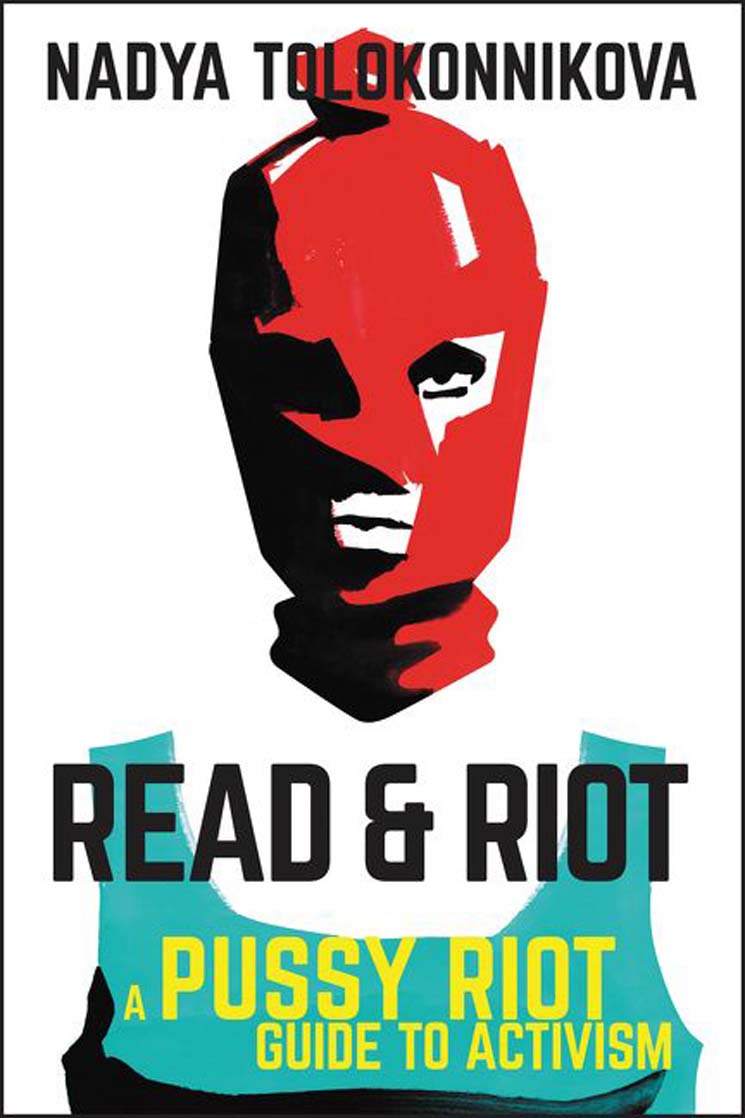Read & Riot conveys the beauty of naiveté — its place in art, in protest and in everyday conscious living. Pussy Riot member Nadya Tolokonnikova cites ten rules to initiate a paradigm shift toward active living, leading the parade against bourgeois isolationist norms, radical hedonism and brutish displays of power.
Active living implies a dedication to leaving our doors of perception open, remaining the child, malleable and sympathetic to outward stimuli: "As a liquid you're free to mix with other liquids too. It's no fun to be ice; I'd rather be water." Tolokonnikova cites endless curiosity and willingness to learn as the most powerful of traits, undercutting the patriarchal voice that defines strength in rigidity and concrete opinion. Tolokonnikova asks for a thoughtful, considered will to power, and does so in such an excited way — even in form, where her thought blocks are separated by exclamation points — that, if you're open to it, you'll be moved into marching with your muses.
As Tolokonnikova awaited her sentencing of two years jail time for performing a "punk prayer" at Moscow's Cathedral of Christ the Savior, her guards, unsurprisingly, harassed her: "'She's fucking pretending to read.' 'I am reading.' I smiled and straightened my polka dot ribbon."
A question of reading is present throughout: its cultural significance, as antithesis from action, or as conductor to meaningful protest. Tolokonnikova notes, "There are cultures of eating, film viewing and book reading, and there is the culture of revolt, the ability to pose awkward questions, cast doubt on things, and change them. Feed the latter."
This is apt advice for anyone inclined to agitate, but it is interesting to note the necessary, meditative pause that benefits the most from voices of other visionaries. Tolokonnikova's writing on her time in the Russian prison system ushers in felt atrocities to the human spirit, and also serve as a moment to discover the Power of the Powerless — both a pure wisdom stemming from those who have burned at the stake, and a text written by Václav Havel, a fellow dissident, artist and Soviet-era inmate. Words invite us to think about other possibilities, other realities, an alternative to ours — they have the potential to stretch our imagination in ways that are not always visible to the human eye. Reading, in Tolokonnikova's work, is a precursor to action: "In the beginning was the word, but deeds followed closely."
I had to occasionally pause my reading to let out tears of joy and relief — Tolokonnikova's guide is an ultimate confirmation that life still exists. That radical ideas still exist. That they haven't been combed over by lackadaisical slugs whispering in the name of liberalism. It's good to be uncomfortable. Re-establish boundaries. I am wont to stop referring to the writer as Tolokonnikova and replace it with Nadya, a friend, who reminded me that there are no limits to the power of the human spirit and will.
What is necessary is a paradigm shift, and Nadya offers the language for this holistic approach.
(Harper Collins)Active living implies a dedication to leaving our doors of perception open, remaining the child, malleable and sympathetic to outward stimuli: "As a liquid you're free to mix with other liquids too. It's no fun to be ice; I'd rather be water." Tolokonnikova cites endless curiosity and willingness to learn as the most powerful of traits, undercutting the patriarchal voice that defines strength in rigidity and concrete opinion. Tolokonnikova asks for a thoughtful, considered will to power, and does so in such an excited way — even in form, where her thought blocks are separated by exclamation points — that, if you're open to it, you'll be moved into marching with your muses.
As Tolokonnikova awaited her sentencing of two years jail time for performing a "punk prayer" at Moscow's Cathedral of Christ the Savior, her guards, unsurprisingly, harassed her: "'She's fucking pretending to read.' 'I am reading.' I smiled and straightened my polka dot ribbon."
A question of reading is present throughout: its cultural significance, as antithesis from action, or as conductor to meaningful protest. Tolokonnikova notes, "There are cultures of eating, film viewing and book reading, and there is the culture of revolt, the ability to pose awkward questions, cast doubt on things, and change them. Feed the latter."
This is apt advice for anyone inclined to agitate, but it is interesting to note the necessary, meditative pause that benefits the most from voices of other visionaries. Tolokonnikova's writing on her time in the Russian prison system ushers in felt atrocities to the human spirit, and also serve as a moment to discover the Power of the Powerless — both a pure wisdom stemming from those who have burned at the stake, and a text written by Václav Havel, a fellow dissident, artist and Soviet-era inmate. Words invite us to think about other possibilities, other realities, an alternative to ours — they have the potential to stretch our imagination in ways that are not always visible to the human eye. Reading, in Tolokonnikova's work, is a precursor to action: "In the beginning was the word, but deeds followed closely."
I had to occasionally pause my reading to let out tears of joy and relief — Tolokonnikova's guide is an ultimate confirmation that life still exists. That radical ideas still exist. That they haven't been combed over by lackadaisical slugs whispering in the name of liberalism. It's good to be uncomfortable. Re-establish boundaries. I am wont to stop referring to the writer as Tolokonnikova and replace it with Nadya, a friend, who reminded me that there are no limits to the power of the human spirit and will.
What is necessary is a paradigm shift, and Nadya offers the language for this holistic approach.
